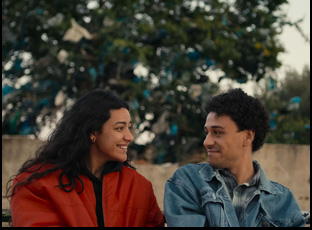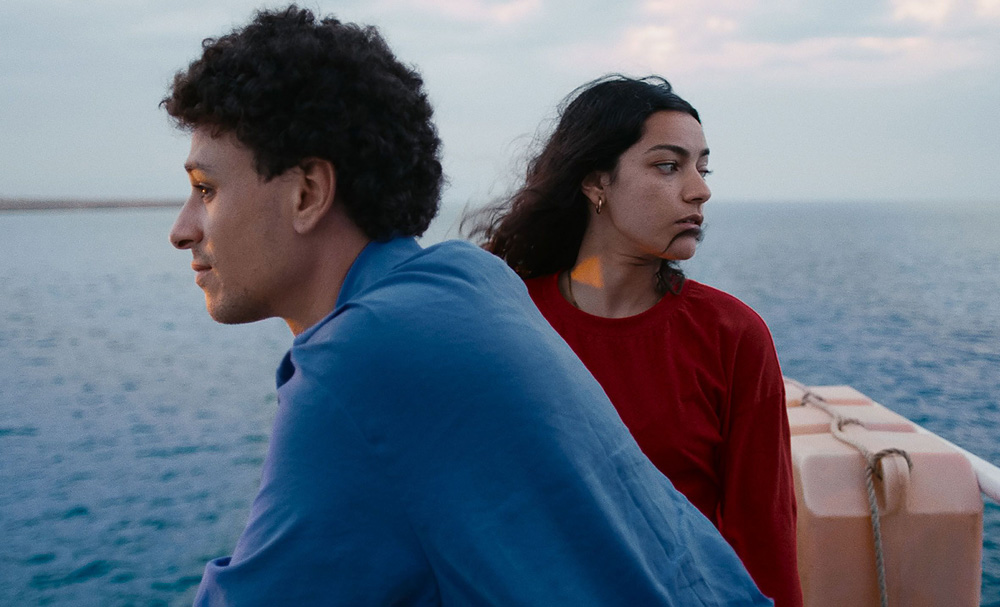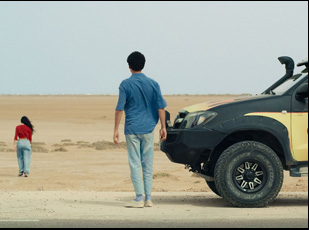Amel Guelatty knows a little something about destiny from her own pursuit of becoming an artist. She had it in her blood to a degree, given her father’s passion for photography and his work in book publishing, but when it came time to pick up a camera herself, she was obliged to try something else out first.
“I wanted to go to Le Femis, which is one of the best schools in Europe for cinema, but you cannot get into Le Femis just after you graduate. You have to study something before and my parents said, ‘Maybe you’re going to change your mind. Maybe you’re not going to like cinema,’ all of those maybes,” Guellaty recalls, which is how she ended up studying law at the Sorbonne. “Of course, I didn’t change my mind and I passed the exam, but I was like, ‘Okay it’s done, can I move now?’ The goal was always cinema.”
That kind of resolve can be seen now both behind the camera and in front of it in her enchanting feature debut “Where the Wind Comes From,” following Alyssa and Mehdi, a pair of childhood friends now in their twenties who are ready to leave the only life they’ve ever known in Tunisia to see what the rest of the world could hold for them. Frustrated by the small-minded community around her, Alyssa seizes upon an art contest where the top prize is a residency in Germany, knowing Mehdi, a talented practitioner of mixed media has a strong chance of breaking through. But submitting one of his pieces is the easy part, getting to the finals across the country to Djerba is whole other matter and after “borrowing” a friend’s monster truck without them knowing, the two set off on an adventure where nearly every experience is a new one when it’s the first time they’ve really been outside their hometown.
If the two find their immediate circumstances stifling, they compensate with huge imaginations and Guellaty isn’t shy about following them into the fantasies they have for themselves to compare with the frustrating realities in front of them. There is no chance for romance when it becomes clear that Alyssa’s interests run towards other women, part of the reason she’s eager to leave her conservative home, but the film itself is hopelessly romantic in terms of what can be achieved by chasing dreams and the various ways love can be expressed when Alyssa and Mehdi push one another to reach their full potential. Guellaty certainly doesn’t appear to be holding anything back in the endearing drama, and shortly before the Sundance premiere of “Where the Wind Comes From,” she spoke about plotting out a road movie to remember, acknowledging both the beautiful and constricting parts of Tunisian society and realizing her own dreams with a debut at the Utah-based film festival.
I started to write “Where the Wind Comes From” because I wanted to write a friendship story. It was really important to create a girl and a boy, especially Arab, that are emotionally connected and don’t have any sexual tension between them. This is the first idea that pushed me to write this story — to talk about friendship, about a strong female character and a sensitive man without making them too much of a caricature, and I really wanted to talk about imagination as I use mine a lot to escape of situations that I don’t like, so I wanted to put this idea in the movie. Imagination is something that always interests me because it’s something that everybody has. Some people develop it more than others, but it’s something you have in your mind. Some people develop it more than others, but it’s independent of where you’re from and what’s your religion, what’s the color of skin or what’s your study, so it’s something that’s always interesting.
How did you find your wonderful lead actors?
Eya [Bellagha], I met when I was doing my first short in 2017 because it was a short movie about a female boxer and I needed a stunt [double] for the boxer, so I was looking for a girl who has the same size as my actress at the time and knew how to box. Eya was a Tunisian Thai boxing champion, but she was only 17 and didn’t know anything about cinema. And when she came in the set, she loved it so much that she started to study acting after that and came back to do the casting [for “Where the Wind Comes From”]. I followed her through the years because even as a stunt [performer], her face was already really powerful, so I already liked her and even if she lacked [experience], I had her in mind, but for Medhi, I didn’t have anyone in mind and I did so much casting to find Slim [Baccar]. I had to meet a lot of actors for this role, and I had a crush on Slim because he had this sensitive part, but at the same time, he can be really also strict, so he had these two parts that I really liked for the role and [Eya and Slim] knew each other, so it was perfect for me.
When I brought them both together, they were incredible actors, but it didn’t match together, like how they look at each other, their gaze, how they laugh, their jokes, so I really put them together in a room. They weren’t friends, but they knew and respected each other, so that was important, and I didn’t expect that they were so cute [together]. Every time I show the movie to a close friend during the editing process, the first thing they say is, “Oh my God, I love them so much. They are so cute together.” I didn’t know that it would be such a perfect match.
What was it like figuring out the road trip element of this? Did the geography actually give shape to the story?
Like a lot of directors, I really wrote with images in my head, so I already knew that, for example, I wanted a nightclub scene because I saw so many movies with incredible nightclub scenes and so many with bad nightclub scenes that could be so good, so it’s something I always wanted. I wanted to see Uthina, this archaeological place because Tunisia has such beautiful places, and most of the tourists that come here for the beach, and they stay in the hotel, and they don’t move and don’t discover anything. Also because I was so tough with Tunisian society, I wanted to compensate by showing beautiful places and parts of the country that are not shown most of the time. The idea was to create a declaration of love for Tunisia, even though the image at the beginning of the movie is a lot of dirty streets, but when they take the roads, I started to show another part of Tunisia. At the same time, I didn’t want to do a touristic video for my country. It was a mix.

I did a lot of research, and it comes from Gabon, an African country. Willie, the artist is a really cool guy, and we did a lot of drafts to really understand what kind of drawing Mehdi [would produce]. I already had a precise idea in my mind, but I wanted something surreal and drawn with a pencil rather than painting, so it made for less possibilities, but it was really interesting to find his own style.
There are gently surreal elements to this in regards to being able to see the characters’ imagination at work. What was it like trying to balance that out with the more grounded elements of the film?
It was one of the biggest challenges, like how much of a part of the film is the imagination. When I was writing, it was really complicated to connect the imagination to Mehdi and then to Alyssa and sometimes I felt it was too much and [other times] I felt it’s not enough. The idea of balance came from “1Q84,” a book of Murakami and I love how in all of his books, you have a surrealistic parts, but they’re really small parts, like you have two moons, but when it’s just a few pages, it’s not focused on it. I really liked that, and this is what I wanted to do in my movie. I didn’t want to focus the whole movie on this — it’s a friendship story. It’s a road trip, but then we’re going to talk about the imagination.
It was really important for me that to distinguish a bit the movie from a genre, and the film has a classical structure, but I really wanted a little bit to get out of this classical structure [too] and to add a little bit of these kinds of scene. [The film] comes from my imagination, so it was really important for me that it’s a form of escape. It was also really complicated to know is it going to be 2D, is going to be 3D, how we were going to do the VFX. Some people when I was writing the script said it was too childish and I really didn’t want that. At the same time, it was [playful], so it was really a challenge to try to find a balance.
What was it like to get the call from Sundance that the film would make its premiere there?
It was incredible, honestly. Sundance was always my dream because I have a particular place in my heart for it. For this movie, the reference was “Little Miss Sunshine.” And it was a Sundance movie. I love “Whiplash” and “Reservoir Dogs” and “Blue Valentine” and all those movies were Sundance movies, which are not too arty and at the same time, a cinema that is not commercial. This line between those two worlds is really for me Sundance movie, and I love how Sundance also takes comedies, but that want to talk about deep things. This is what I want to do with “Where the Wind Comes From.” I want to talk about deep subjects, but in a light way, and I always thought this movie is a Sundance movie. If I could do that, it would be my dream, so when I received the e-mail from Sundance, I was the happiest girl on earth at that minute at least.
“Where the Wind Comes From” will screen at the Sundance Film Festival on January 26th at 9:15 pm at the Egyptian Theatre, January 27th at 4:40 pm at the Megaplex Redstone, January 29th at 6:30 pm at the Broadway Centre Cinemas, and January 31st at 4:15 pm at the Holiday Village Cinemas. It will also be available online from January 30th through February 2nd via the Sundance virtual platform.





